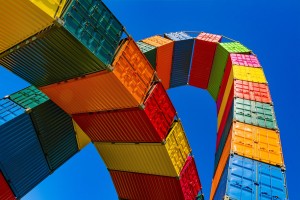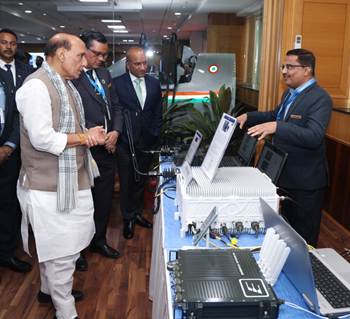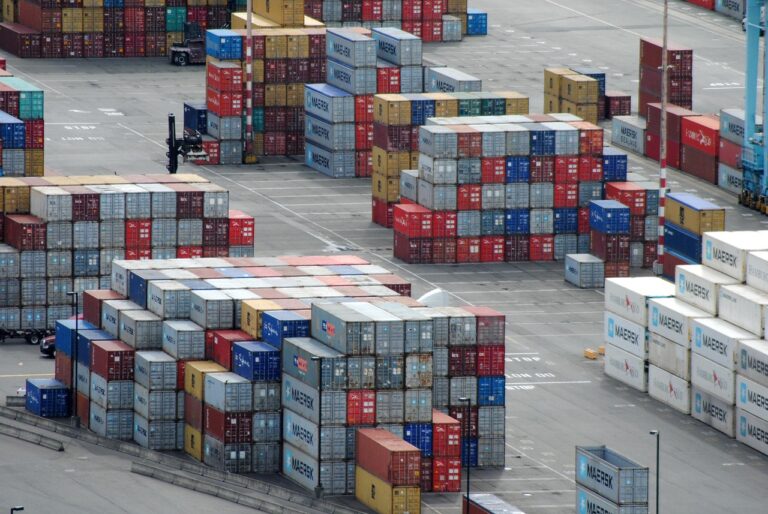
Pandemic, Trade and SDGs -1
Geneva: Trade in all forms has been extremely adversely affected by the COVID-19 pandemic as production and consumption were scaled back globally. The COVID pandemic affected global trade through a complex network of both supply and demand shocks.
On the supply side, the social distancing measures and border closures that were adopted globally in order to restrict the spread of COVID19 have reduced air freight capacity, halted industrial production, and limited port activities, and restricted the ability of businesses to operate. Consequently, both production and export capacities were severely restricted. In the case of global value chains, the inability to source production inputs resulted in a breakdown of several global value chains.
The COVID-19 induced demand shock was no less damaging. The world’s largest importing economies displayed sharp drops in aggregate demand due not only to social distancing measures affecting ability to purchase, but due also to loss of jobs and incomes in these countries. As a result of the pandemic, border closures and social distancing measures, governments across the world have faced large declines in economic activity, recessions, and budgetary shortfalls while populations have faced large threats to access to income, employment and food.
The effects of these declines in trade have heterogenous effects between countries and within national populations, and there is already evidence that women will be more negatively affected due to their overrepresentation in the food service, retail, textile and apparel manufacturing, and informal employment. This complex network of job losses, reduced income, and decreased health outcomes will have significant impacts global human development and the achievement of the 2030 Agenda and Sustainable Development Goals (SGDs).
In a keynote address to the United Nation’s High-level Political Forum on Sustainable Development, World Trade Organization Director-General Dr. Ngozi Okonjo-Iweala said trade has an essential role to play in efforts to combat the COVID-19 pandemic and revive progress towards the Sustainable Development Goals (SDGs).
“Trade is a necessary ingredient in building back a stronger and more inclusive global economy, and reviving progress towards the Sustainable Development Goals,” she said and pointed out that trade had played an important role in the historic development achievements and poverty reduction during the thirty years before COVID-19. “And trade will be at the centre of our efforts to end the pandemic,” she asserted.
This year’s High-level Political Forum on Sustainable Development, from July 6-15, has the theme “Sustainable and resilient recovery from the COVID-19 pandemic that promotes the economic, social and environmental dimensions of sustainable development: building an inclusive and effective path for the achievement of the 2030 Agenda in the context of the decade of action and delivery for sustainable development.” It will place special emphasis on reviewing progress towards nine of the 17 SDGs (Goal 1 on no poverty, Goal 2 on zero hunger, Goal 3 on good health and well-being, Goal 8 on decent work and economic growth, Goal 10 on reduced inequalities, Goal 12 on responsible consumption and production, Goal 13 on climate action, Goal 16 on peace, justice and strong institutions, Goal 17 on partnerships).
DG Okonjo-Iweala noted that the pandemic had dealt a severe blow to the pursuit of the SDGs, citing projections from international institutions for increased poverty, hunger and joblessness. “Reducing inequalities of all kinds is at the core of the SDGs,” she noted. “But the pandemic has widened inequalities inside households, within national economies, and across countries.”
“At the global level, we see growing evidence of a K-shaped economic recovery,” she said, with countries’ economic prospects “bifurcating in line with their access to vaccines and their fiscal and monetary capacity to provide economic relief and stimulus”.
She noted that in June, while 1.1 billion COVID-19 vaccine doses were administered worldwide — a welcome 44% increase compared to May — only 15 million of those doses, or less than 1.4%, were administered in Africa. As of July 2, 2021, people in low-income countries had received 1.3 doses per 100 residents, compared to nearly 83 doses per 100 in developed countries, she said.
The Director-General said trade would play a fundamental role in increasing vaccine production, and in making growth more inclusive by letting countries tap into higher growth elsewhere.
A WTO Secretariat report submitted to the High-Level Political Forum emphasises the role played by trade in pre-pandemic poverty reduction in developing and least-developed countries. By making goods more affordable, the report notes, trade helps boost the purchasing power of poorer households and expand economic opportunities for women and young people. Robust international cooperation can help keep markets open, effective and predictable — including global supply chains for essential medical goods and services — and support governments’ post-crisis recovery strategies. Achieving food security objectives will be easier with well-functioning global agricultural markets, the report adds.
The WTO report also points to the importance of mitigating the disproportionate effect of the crisis on micro, small and medium-sized enterprises, women and developing countries not fully integrated into global supply chains.
Dr. Okonjo-Iweala emphasised that a WTO agreement on fisheries subsidies would not just meet SDG target 14.6, but send a wider signal: that WTO members “are still capable of negotiating multilateral agreements and responding to global challenges”. She urged delegations to bring new flexibility to the upcoming WTO virtual ministerial meeting on fisheries subsidies on 15 July, where she said ministers had an opportunity to bridge gaps and lay the groundwork for finalizing agreement by the 12th Ministerial Conference in early December.
– global bihari bureau





